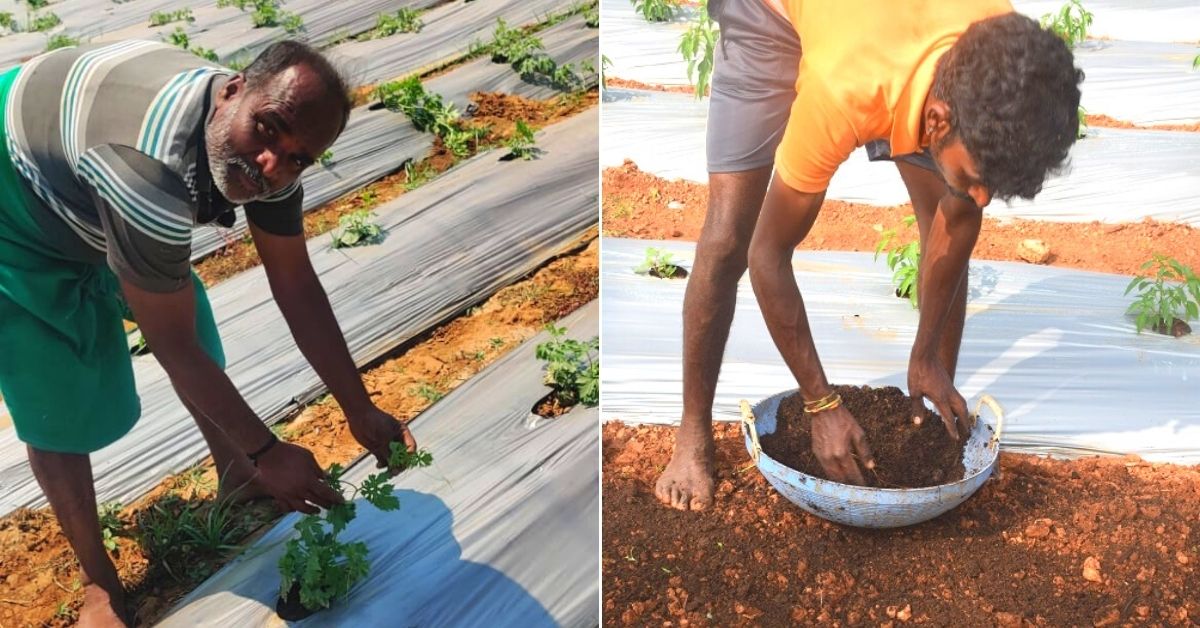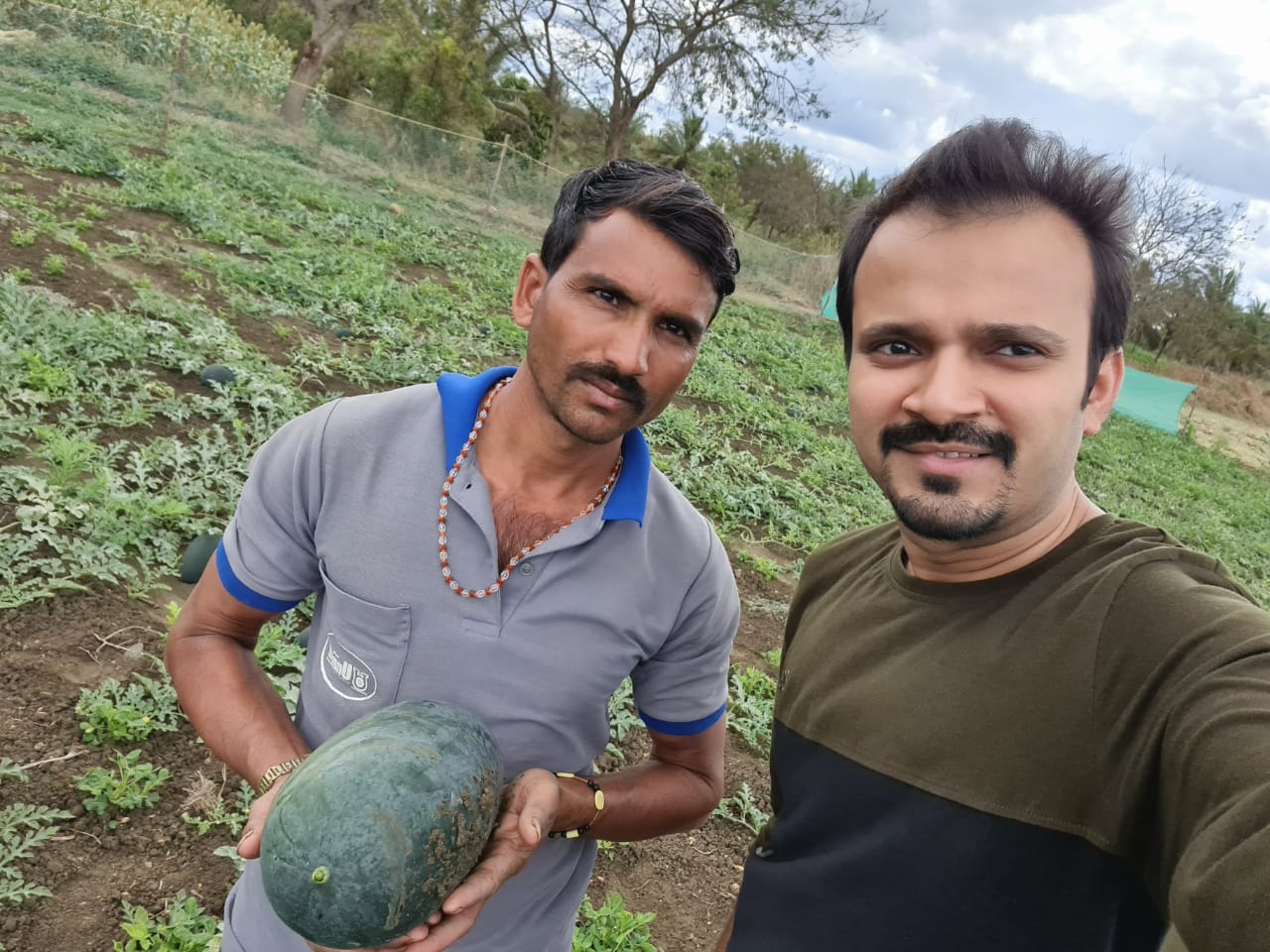Nimble Growth, a Bengaluru-based startup, was founded by Rahul Saria and Nagendra Kalkuli in 2017 with a vision to ensure their customers eat healthy organic foods while securing farmers a sustainable income by ensuring they avoid the pitfalls of chemical use on the soil.
To fulfil their vision, both of them left their cushy corporate jobs behind. Rahul gave up a successful career as a chartered accountant. He had earlier served as Chief Financial Officer (CFO) for a couple of well-known startups like Rentomojo and Vedantu. Nagendra left behind a successful two-decade-long career in the software industry working for global giants like Microsoft and Dell. But he also comes from a family of farmers, who gave him a worm’s eye view of the ground realities associated with the farm sector in India.
Both of them were joined by Pradeep Kumar, a computer science graduate with 20 years of corporate experience who heads sales at Nimble Growth, and Abhisek Bhagchandka, an expert in Operations and Analytics. Working in coordination with their farmer partners, the startup is today engaged in the supply of authentic organic fruits and vegetables.
“Presently, we serve the Bangalore [Karnataka] and Hyderabad [Telangana] market with maximum share in organic food supply. We partner with farmers and take care of the complete production process from sowing to harvesting, to ensure the quality of the process and the product is maintained. Our farms are certified organic by accredited agencies under the Agricultural and Processed Food Products Export Development Authority (APEDA),” says Rahul, speaking to The Better India. Nimble Growth’s (NG) USP lies in its production methodology which they claim is “scientific and original made in consultation with the award-winning organic farmers of India”.

Package of Practice
Taking nothing for granted before embarking on their startup idea in 2017, the co-founders embarked on a process of learning about and understanding best organic farming practices. They spent months interacting with leading agricultural scientists and farmers, who were already engaged in the practice of organic farming. This process led to the creation of their unique and proprietary knowledge bank called the package of practice (PoP).
“NG has its own proprietary in-house developed PoP, which entails a stepwise plan from sowing to harvesting for each crop that we produce. Say, if a perennial crop has a cycle of 90 days. The PoP would contain daily activity for the said crop from day 1 to day 90, from sowing to application of bio-fertilizers, irrigation, bio pest control measures like neem spray, etc. At NG, we ensure that our farms follow the PoP to ensure the quality of the produce, which was prepared after a lot of experiments and consultation with award-winning organic farmers of India. We continue to experiment in some patches of land and study the data and outcome as we add new SKUs (Stock-Keeping Unit) and processes,” claims Nagendra.
Their farmer engagement and the production process entails the following steps:
1. Onboarding – Identify the right farmer / landowner – negotiate long term deal
2. Training – Train the farmer on NG’s philosophy & how we deliver quality output
3. Enabling & Review – Give access to all tools, resources and to NG’s expert consultants
4. Distribution – Once the output is ready, get the produce certified and enable sales
The entire process is driven by tech-enabled controls in place.
So far, the startup claims to cultivate more than 150 tonnes of organic produce a month and is engaged with over 250 farmers cultivating organic produce spread across 500 acres at Haveri, Gundlupet, rural Bengaluru and other areas of Karnataka, while the produce is sold in Hyderabad and Bengaluru.

Convincing Farmers to Take The Leap
So far, the Bengaluru-based startup has helped 250 farmers switch from conventional chemical-based farming to organic, which has over time improved soil quality as well.
“Initially, convincing farmers was a big challenge for two reasons — lack of trust owing to past experiences and the initial dip in production yields. In the first two years after transitioning to organic, there is a dip in the production yield of about 30% to 40%,” says Nagendra.
To match the yield generated by chemical cultivation, the startup claims, it takes about three years, following which output levels tend to rise. NG addressed these teething problems by convincing farmers that they would buy their produce at predetermined prices before the sowing season. While it didn’t entirely make up for the loss, it did soften the blow.
“We solved these challenges for our farmer partners and ensured that they did not lose money on any of these fronts. To build trust, we have also created a Farmer Producer Organisation (FPO), in which we make our farmers members, which gives them a sense of belonging. In the future, through this FPO, we plan to create provisions for education and insurance for farmers and their families as well,” says Rahul.
NG enrols these farmers by first meeting them and conducting checks on facets like soil type, local environmental conditions, irrigation facilities, climate, types of produce best suited for, chemicals being used in the land and the surrounding lands, etc.
After this, based on the startup’s requirements, they enrol the farmer and plan production depending on the season, train them in the organic crop production process and give them quantity and price commitments even before sowing. “Once onboard, we support them through the complete process from sowing to harvesting,” adds Rahul.
By the end of this year, the startup plans to onboard more than 1,000 farmers. Meanwhile, the startup also deals with more than 80 SKUs, of which, say, 20 to 25 contribute towards 70% of the volume. “In total, we have almost all the fruits and vegetables that one can think of on our produce roster. We even deal in greens and exotics. We sell our produce in the Bangalore and Hyderabad market to independent organic stores, large format retail (LFR) stores, B2C online aggregators and other such enterprises,” says Pradeep.

As part of its evolving business model, NG aims to enter into contract farming with the farmers, where it sources its produce at a predetermined price.
For the time being, however, farmers are seeing an increase in income as compared to conventional chemical farming owing to the premium prices that organic produce fetches. The startup claims a few of their farmers even make as much as Rs 1.5 lakh per month. Most of the farmers they work with are in the marginal segment working on 3 to 5 acres.
“We commit to the quantity to be produced as per our demand prediction for the year and the sowing is done accordingly. We also commit to a minimum support price (MSP) for each crop. Generally, organic produce fetches approximately 30% to 60% premium to conventional pricing,” explains Abhisek. After all, data plays a key role in the company starting from predicting annual demand. This figure is further broken down into three seasons and, eventually, monthly and weekly harvesting plans at an SKU level.
Achieving this requires expertise in data science and number crunching.
“We have our processes built-in to control the complete process since we cannot compromise on quality. Every step in the PoP is captured through an online application and also through our employees (agri-graduates) who are allocated to various farms. During visits, they hold discussions with the farmers as per the PoP. Further, we conduct regular farmer meets based on area clusters,” explains Nagendra.
Unlike most businesses in the world, COVID did not have a significant negative impact on their business. “After all, our customer base didn’t stop eating but ate more when at home. Of course, operationally, it has been quite challenging, but our team has worked relentlessly even during these tough times. One thing the COVID has taught all of us is that health is critical and eating good food is pertinent, which has increased the demand for organic fruits and vegetables. This shall help us further drive growth,” notes Rahul.
NG is now looking forward to becoming a “production powerhouse” of organic fruits and vegetables.
“We have the first-mover advantage, as there is no brand across India in this space. Although we are a bootstrapped venture, we have begun to raise some angel funding from investors. For FY21, our revenue was more than $1.2 million. In the next 18-24 months, we are aiming for a $5 million to $7 million top line in revenues,” claims Rahul.
(Edited by Yoshita Rao)
No comments:
Post a Comment